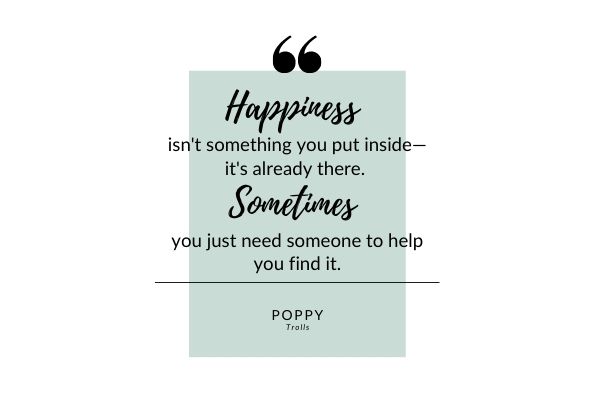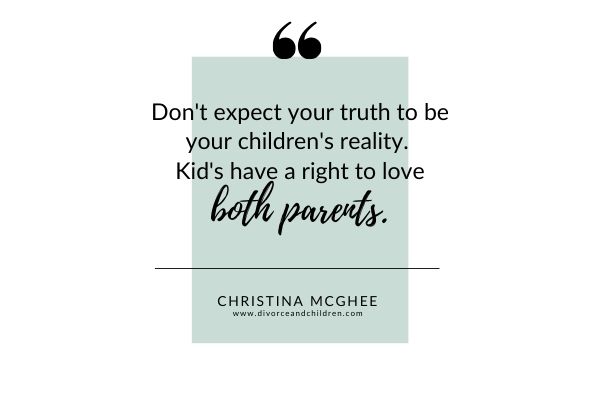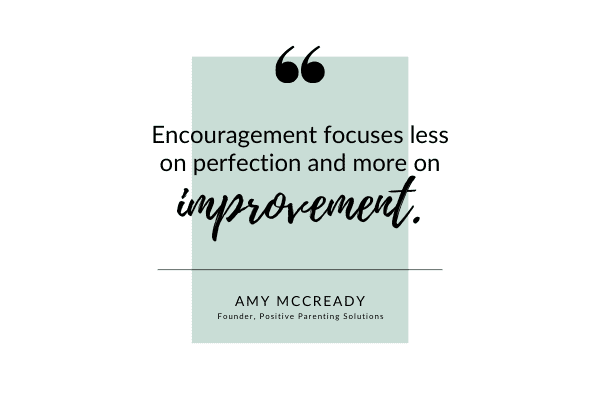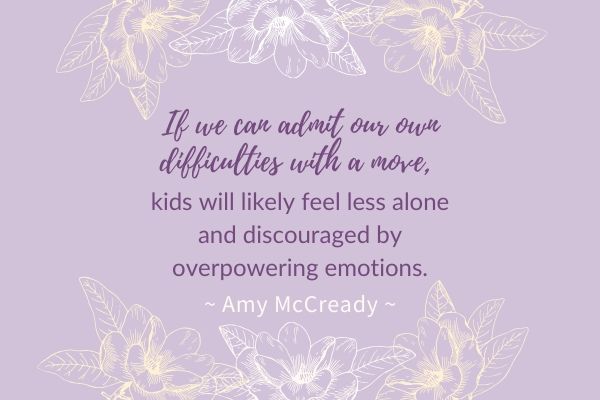


“He took my toy and won’t give it back!”
“It was my turn to win. He’s a cheater. It’s not fair!”
“You’re going to be in BIG trouble when I tell on you!”
Ah yes. The snitch. The rat. The informant. It’s a common theme in mobster movies–and on the local playground.
It’s no secret that in our culture, tattling is seen as negative. It’s nitpicky complaining–a nuisance–and none of us have time to deal with it. Am I right?
But there are a lot of grey areas, and the difference between tattling and whistleblowing–raising a legitimate alarm–can be complicated.
As with all our kids’ behavior, when we take a look at the reasons behind tattling, we can discover how to solve the problem. So let’s dive in: why do kids tattle so much, and when do we need to either encourage or discourage it?
When Tattling is Unhelpful
While there are plenty of times we need to know what’s going on, most of the cases are nothing more than simple tattling–and therefore unnecessary. The tales our kids tell don’t serve a real purpose or are used for negative, harmful reasons.
The general rule is that if it doesn’t help someone, tattling is not a good solution. That’s why it’s also important to train kids in problem-solving. The more comfortable they are with handling eyebrow-raising behavior in positive ways, the less they’ll feel a need to tattle.
Here are the 4 main reasons children resort to negative tattling:
1. Tattling for Attention
One of the top reasons kids choose to tattle is simply to get our attention.
Maybe you’ve been staring at your iPhone too long or working a lot from home. Children of any age can quickly start to feel left out and insignificant.
To counter this, kids will find any reason at all to be noticed. To them, even negative attention is better than no attention.
So if your 4-year-old is tired of watching her older brother’s TV shows, it’s an opportune time to get your attention by complaining about how he’s going over his screen time minutes for the week. If your 6th grader just wants some sympathy, he might go on and on about how his friend selfishly played Minecraft without him at their last sleepover.
The solution to reducing tattling, in this case, is giving our kids more proactive, positive attention.
I know that in our incredibly busy lives, this isn’t so simple. But it can start small. Carving out a brief 10-15 minute block each day to do something fun with each of our kids can work wonders. As long as it’s undistracted, one-on-one time, we’ll find our kids less likely to seek our attention in negative ways (like nitpicky tattling).
2. Tattling Out of Spite
Kids have their moments of anger and frustration. They can feel hurt by a friend, mad about a demanding sibling, or filled with general angst.
If your tween is angry with his older sister, he may divulge that she’s listening to inappropriate, explicit music.
Your 5-year-old, mad at his annoying little brother, might decide to tell you that his little brother hit him yesterday–all in hopes that he gets in big trouble today.
When tattling comes from anger or spite, we can use in-the-moment redirection.
You can say “Are you telling me this to get your brother in trouble, or are you trying to help him?”
Most kids will respond that they are trying to help. You can then say something like, “Okay, let’s focus on solutions to his problem. What ideas do you have to help him out?”
If the spiteful tattling continues, you can tell your kids the tattling department is closed. Make sure they understand that from this point on, you expect they will limit their “I’m telling!” communications to helpful informing.
3. Tattling to Feel More Important or Mature
As much as kids like attention, they also like to feel grown-up.
A second-grader might feel empowered after telling her teacher that another girl (reportedly) teased a boy about his hair. Knowing that teasing can be bad–even though she didn’t personally witness the event–it makes her feel important to report and condemn it.
To counter this, we need to encourage maturity in other ways.
One avenue is to give kids more age-appropriate choices. The same second-grader might savor being responsible for a day of meal planning, choosing the discussion topics at the next family meeting, or picking out her own school clothes.
Kids should be encouraged to do anything they are capable of doing on their own. This means that a five-year-old can start packing her own lunch and emptying the dishwasher without help (it just takes a little training at first) and a teenager can wash his own clothes, gas up his own car, and definitely do his own homework.
Even if they rebel against it, asking kids to take on responsibility gives them confidence. They are empowered by their abilities–big or small–and encouraged by our trust.
It’s also likely they’ll no longer need to point out someone else’s shortcomings or misbehaviors to feel better about themselves.
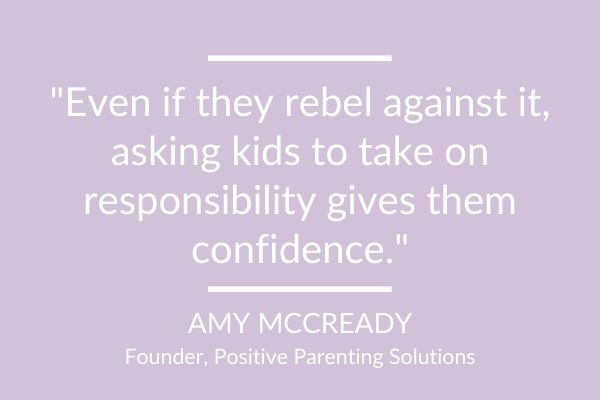
4. When the Tattler is Unwilling (or Needs to Learn How) to Problem Solve
When children are given the tools to problem solve, this erases the need for unhelpful tattling.
“…children who tattle have obtained enough social-emotional skills to refrain from hitting, but not enough to solve the problem on their own.” – Eileen Kennedy-Moore Ph.D., Psychology Today
One of the best tactics is to Take Time for Training (just one of our 36 7-Step Parenting Success System® tools) and role-play different scenarios.
For example, you could start by saying to your child, “Let’s pretend that you and Sam are playing outside and Sam won’t let you play with his basketball. You come to me to tell me that Sam won’t share the ball. Is this tattling or informing?”
This scenario is clearly an example of unhelpful tattling, as the goal is to get Sam in trouble. Once identifying the goal in each example, help your child brainstorm ways she could solve the problem on her own without tattling.
Then, the next time your kids are tattling about a sibling argument, reply with, “I have confidence you two can work it out.” Drive the point home by giving them a chance to do so.
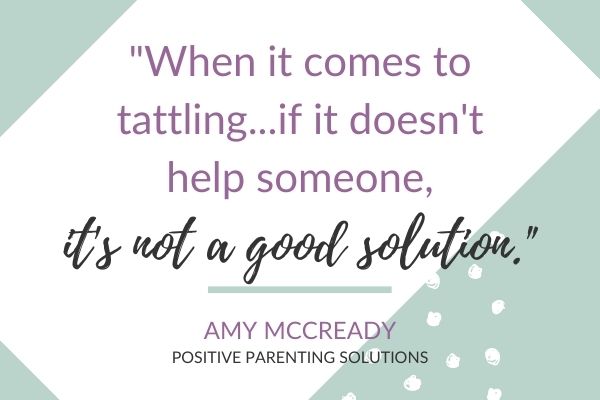
By creating a distinction between useless tattling and beneficial informing, our kids will know when to come to us and when they can solve problems on their own. Focusing on problem-solving also allows our children to master a lifelong skill.
But it can certainly be difficult for kids to distinguish between true problems and minor infractions. The choice is rarely obvious. (To learn WHY kids have trouble making the best choices when it comes to tattling–or any other frustrating behavior–check out my FREE ONLINE CLASS!)
For kids to know appropriate and inappropriate reasons to involve adults and report what they see, they need explanation and training. Here’s how to help:
Tell Them When To Tell
Begin by differentiating tattling from the more helpful advising, notifying, or telling, all of which are more positive.
Even before our kids report negatively about someone, we can role-play scenarios with them–especially those that lie in those grey areas–to determine when to involve an adult.
Here are 3 situations when we should encourage our kids to speak up:
1. Someone’s In Danger
First, our kids need to understand that telling or informing is the right thing to do when someone is in a dangerous (or potentially dangerous) situation.
Your teenage son could have witnessed a friend drive home drunk last weekend or been in a car with another friend who was texting while driving. Your daughter might have noticed her little brother run straight into the street without looking. Your kid’s friend might be sneaking out at night. Or, your tween might notice her older sister corresponding intimately with an online stranger.
Whenever real danger is involved, a responsible adult needs to be, too.
2. Someone’s Being Bullied
Sometimes kids need to let things roll off their shoulders, like a classmate making fun of their clothes or a sibling purposefully hogging the remote.
It’s also unnecessary for kids to meddle in everything that’s wrong, like a random person calling another friend a bad name or a brief playground stand-off.
But other times, kids witness or experience things that go too far–and an adult needs to know.
A few generations ago, kids were often told to “suck it up” around a classroom bully. They were even encouraged to physically fight back. Verbally reporting a bully wasn’t as honorable as standing one’s solitary ground.
Today, we know these aren’t the messages we want to send our kids. Instead, we want to assure them that violence is never the answer and they don’t have to face harassment alone.
Luckily, more schools are tackling bullying head-on and not dismissing it as just “another part of growing up.” Whether it’s bullying in-person or cyberbullying, numerous campaigns to end harassment between students are gaining support and momentum.
Our society is also starting to acknowledge the importance of mental health. We’re concerned with the increasing suicide rate amongst young kids where bullying is the culprit.
Encouraging kids to report bullies is a huge part of the solution. Maybe our kids’ friends are being bullied or our kids themselves are feeling harassed. It’s important they understand there’s no need to put up with it or turn a blind eye.
If you’re uncertain, three red flags to identify something as “bullying” are persistence (happens more than once or often), power imbalances, and/or physical and verbal intimidation.
A single stand-off, unless it meets the above criteria, is best handled by kids themselves. This is also helpful when we ourselves can’t determine the truth of what actually happened.
Even if it means getting a person in serious trouble, addressing bullying helps other potential victims and may eventually help the bully himself/herself. It’s all part of teaching our kids how to act kindly and appropriately toward one another.
3. Someone’s Engaging in Illegal Activity
Kids also need to be educated about the risks of illegal activity. Whether it’s your teen’s friend using a fake ID to buy liquor, her older sister dabbling in drugs, or your 6th grader’s friend shoplifting at Target, explaining that these behaviors can have long-term consequences helps kids understand when and why to reveal compromising information.
Again, children might feel like tattling on friends is a complete betrayal. Their friends will also likely see it this way. And friendships, especially for teens and tweens, are sacred.
We can sympathize with our kids if they are caught in this difficult situation. But, it’s essential to remind them that reporting illegal activity is actually what’s best for their friends in the long run. It may have serious implications, but this information will get them out of even more long-term trouble; like continually unsafe situations, a possible juvenile record, or even drug addiction.
When It’s Hard to Tell–Literally
Keep in mind that sharing information–without that person’s approval–can put kids in an awkward situation.
Kids may avoid reporting something bad out of fear of losing a friend or being ostracized. It’s important we help them understand when–and why–putting relationships at risk can be more important than shared secrecy.
Along the way, we can reassure them that we’ll respond with respect and guidance appropriate for the situation and help their friend get assistance. Be open and honest about things like confidentiality, especially with older kids.
Beyond asking kids to report scenarios, we can make it easier by sustaining positive, open communication with them. When we’re focused on healthy, non-judgmental dialogue, they’re more likely to confide in us when it’s important to do so.
Once our kids do come to us with the information they believe is dangerous, we need to applaud them for their actions and their bravery. It’s not an easy thing to do. In extreme circumstances, they may even be compromising their own safety–like exposing sexual abuse or domestic violence. In this case, we need to protect them as quickly as possible by notifying authorities.
The Grey Area
The difference between helpful and unhelpful tattling can still be vague, even with discussion, training, and practice. There could be a girl in your first-grader’s class that complains to you at school pick-up about your son chasing her too much. It seems like something she and your son could problem-solve on their own (you don’t believe he was trying to bully her) but it could also be something that really disturbed her.
And what if we aren’t sure what the truth is? Two kids might have opposing arguments about what actually occurred and it becomes “he said, she said.”
Like any misbehavior, we can decide on a case-by-case basis how serious the conflict is and how it needs to be addressed. We may also need to circle back and either train on conflict resolution or, alternatively, let a child know it was the right choice to involve us. This kind of feedback will help kids make a good decision next time.
Final Thoughts
Dealing with tattling can be tricky. After all, we appreciate being “in the know” about little Peyton’s tendency to stray into the neighbor’s yard or Aaron’s lying habit. But that doesn’t mean we want to hear about every little complaint our eight-year-old can come up with in regard to her little brother.
We also live in a world where danger, illegality, and bullying too often make the news. We want to teach kids–as young as possible–not to fear, ignore, or propagate poor behavior, but to instead make responsible decisions about when to reach out for adult guidance.
We can help our children determine where to draw the line between what’s helpful and unhelpful. After all, tattling can be a silly frustration–or it can go so far as to save a person’s life.
The distinction is crucial.
Is your patience wearing thin? Join Amy for a FREE ONLINE CLASS and learn how you can become the calm, confident, and in-control parent you want to be–no yelling required!



